Schaffer emerson - Study guides, Revision notes & Summaries
Looking for the best study guides, study notes and summaries about Schaffer emerson? On this page you'll find 60 study documents about Schaffer emerson.
Page 3 out of 60 results
Sort by
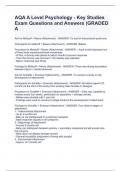
-
AQA A Level Psychology - Key Studies Exam Questions and Answers (GRADED A
- Exam (elaborations) • 13 pages • 2024
- Available in package deal
-
- £8.00
- + learn more
Aim for Meltzoff + Moore (Attachment) - ANSWER -To test for interactional synchrony Participants for Meltzoff + Moore (Attachment) - ANSWER -Babies Procedure for Meltzoff + Moore (Attachment) - ANSWER -- Adult model displayed one of three facial expressions/hand movements - At first, a dummy was placed in baby's mouth to prevent response - Then the dummy was removed + the display was repeated - Baby's response was filmed Findings for Meltzoff + Moore (Attachment) - ANSWER -There wa...
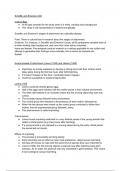
-
Psychology- Schaffer & Emerson AO3
- Summary • 2 pages • 2024
- Available in package deal
-
- £4.49
- + learn more
These are my online notes about "Schaffer & Emerson AO3" based on A Level AQA Psychology's "Attachment" topic.
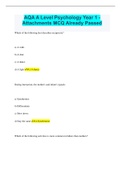
-
AQA A Level Psychology Year 1 - Attachments MCQ Already Passed
- Exam (elaborations) • 17 pages • 2023
- Available in package deal
-
- £7.70
- + learn more
AQA A Level Psychology Year 1 - Attachments MCQ Already Passed Which of the following best describes reciprocity? a) A walk b) A chat c) A dance d) A fight c) A dance During interaction, the mother's and infant's signals: a) Synchronise b) Differentiate c) Slow down d) Stay the same a) Synchronise Which of the following activities is more common in fathers than mothers? a) Smiling b) Holding c) Imitate d) Playing d) Playing Which of these is a strength of research into early inter...
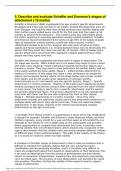
-
5. Describe and evaluate Schaffer and Emerson's stages of attachment ( 16 marks)
- Exam (elaborations) • 4 pages • 2024
-
- £8.47
- + learn more
5. Describe and evaluate Schaffer and Emerson's stages of attachment ( 16 marks) Schaffer & Emerson (1964) investigated the age at which specific attachments developed and if this was common to all infants. Studied 60 babies that were all from Glasgow, the majority were from skilled working class families. Babies and their mothers were visited every month for the first year and then again at 18 months to observe their behaviour . The mothers were also interviewed about the child’s response ...
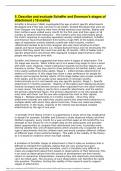
-
5. Describe and evaluate Schaffer and Emerson's stages of attachment ( 16 marks)
- Exam (elaborations) • 4 pages • 2024
-
- £8.08
- + learn more
Describe and evaluate Schaffer and Emerson's stages of attachment ( 16 marks) Schaffer & Emerson (1964) investigated the age at which specific attachments developed and if this was common to all infants. Studied 60 babies that were all from Glasgow, the majority were from skilled working class families. Babies and their mothers were visited every month for the first year and then again at 18 months to observe their behaviour . The mothers were also interviewed about the child’s response in ...
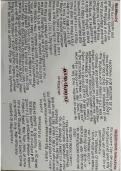
-
EVERYTHING YOU NEED TO KNOW IN ATTACHMENT PSYCHOLOGY - AQA
- Summary • 18 pages • 2024
-
- £12.48
- + learn more
This includes topics such as; - Introduction to attachment - Reciprocity and interactional synchrony definitions. Meltzoff and Moore (1997), Isabella et al (1968) - Animal Studies - Harlow and Lorenz - Role of the father - Grossman et al (2002), Field et al. (1978), Schaffer and Emerson (1964) - Cultural variations in attachment - Van Ijzendoorn and Kroonenburg (1968), Simonelli et al (2014) - Learning theory of attachment - operant conditioning, classical conditioning and attachment as a...
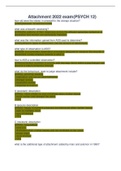
-
Attachment 2022 exam(PSYCH 12)
- Exam (elaborations) • 11 pages • 2022
-
- £6.54
- + learn more
Attachment 2022 exam(PSYCH 12) how old were the infants in ainsworth's the strange situation? {{ANS}}between 12 and 24 months what was ainsworth assessing? {{ANS}}the patterns of their responses across the different episodes, behaviour at separation and reunion are particularly important what was the information gained from ASS used to determine? {{ANS}}different types of attachment (not the amount of attachment). what type of observation is ASS? {{ANS}}It is a controlled observat...

-
Attachment
- Summary • 19 pages • 2023
- Available in package deal
-
- £4.99
- + learn more
This document covers the Attachment topic in A level psychology: caregiver-infant interactions, Schaffer and Emerson, role of the father, animal studies (Harlow and Lorenz), learning theory, Bowlby, Bowlby's theory of maternal deprivation, Ainsworth's strange situation, and cultural variations.
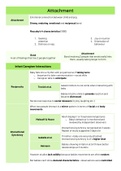
-
Complete A* Revision Guide For Attachment Topic - AQA Psychology
- Summary • 11 pages • 2022
- Available in package deal
-
- £7.49
- + learn more
A complete and detailed revision guide for the Attachment topic including AO1 and AO3 points for all parts of the specification. Created for use with AQA A-Level Psychology Specification Notes are concise and colourful to aid revision and secure top grades in exams!
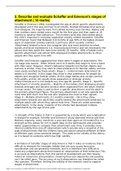
-
5. Describe and evaluate Schaffer and Emerson's stages of attachment ( 16 marks)
- Exam (elaborations) • 4 pages • 2023
-
- £6.54
- + learn more
5. Describe and evaluate Schaffer and Emerson's stages of attachment ( 16 marks) Schaffer & Emerson (1964) investigated the age at which specific attachments developed and if this was common to all infants. Studied 60 babies that were all from Glasgow, the majority were from skilled working class families. Babies and their mothers were visited every month for the first year and then again at 18 months to observe their behaviour . The mothers were also interviewed about the child’s response ...

Study stress? For sellers on Stuvia, these are actually golden times. KA-CHING! Earn from your revision notes too and start uploading now. Discover all about earning on Stuvia


